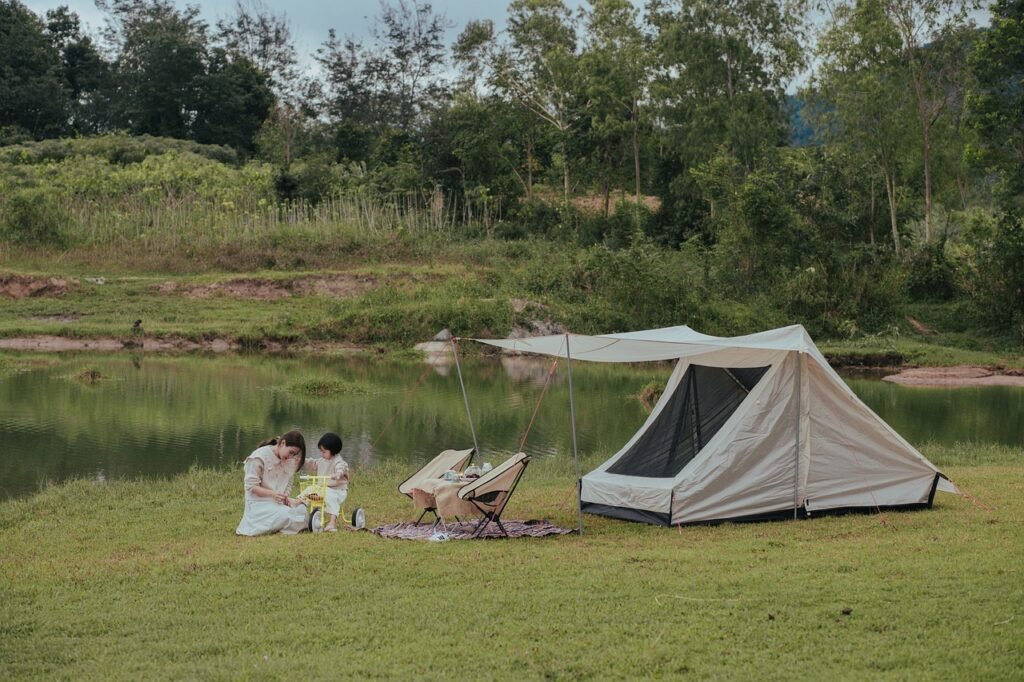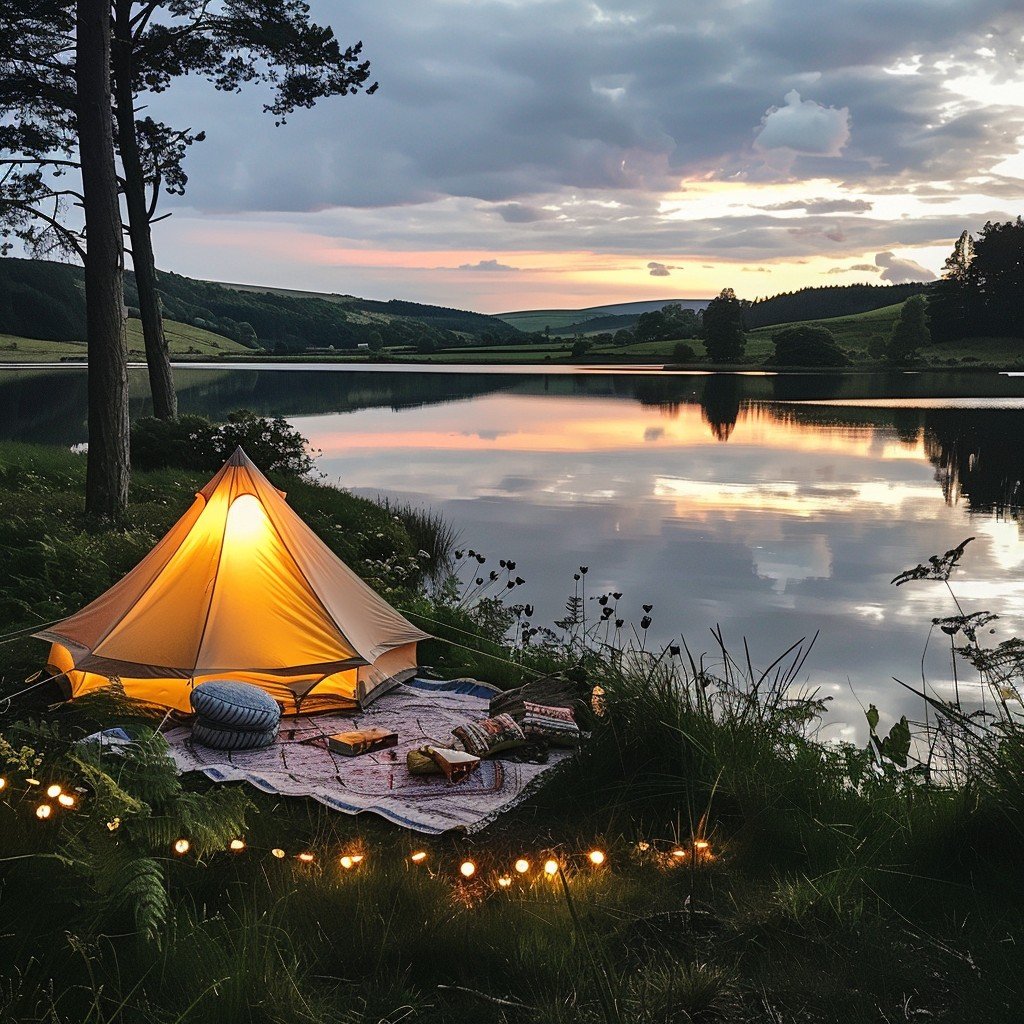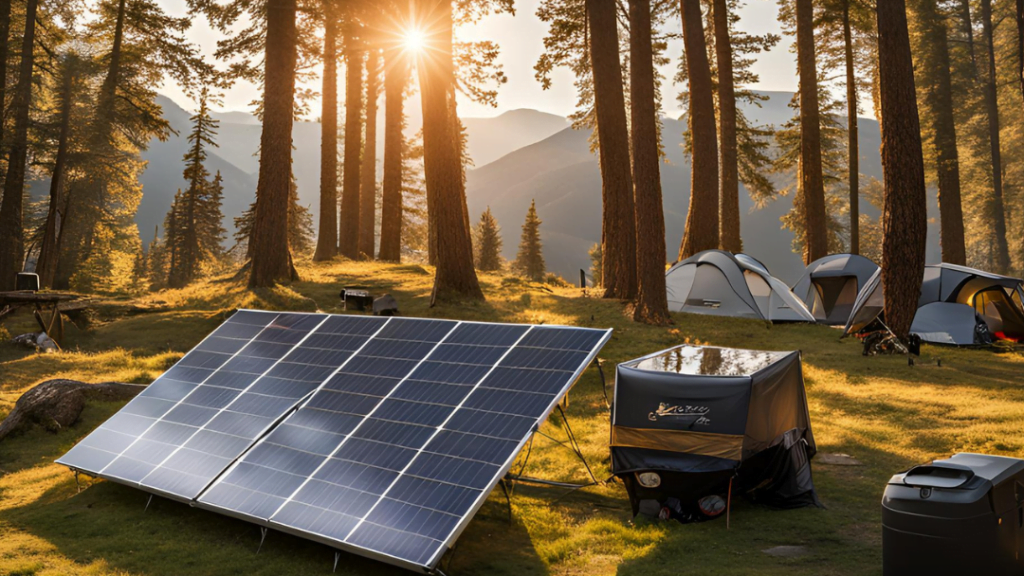Solar Power Needs Calculator for Camping
Your Solar Power Requirements
Required Solar Panel Size: Watts
Required Battery Capacity: Amp-Hours
How It Works:
- Inputs:
- Device Power (Watts): Power consumption of your camping device(s).
- Usage Time (Hours): Average daily usage.
- Battery Backup (Days): Number of days you want backup power.
- Sun Hours (Hours): Average daily sunlight hours at your location.
- Outputs:
- Solar Panel Size: Required wattage for your solar panels.
- Battery Capacity: Required battery capacity in amp-hours (Ah), assuming a 12V system.

Solar Power Needs Calculator for Camping
Camping is a fantastic way to reconnect with nature, but modern conveniences like lighting, charging devices, and running small appliances often require a reliable power source.
Solar power is an eco-friendly and efficient solution for meeting these needs during your outdoor adventures. A solar power needs calculator for camping can help you determine the exact size and capacity of the solar setup you’ll need.
This guide will help you calculate your power requirements, choose the right solar panels, and build a camping-ready solar power system.
Why Use Solar Power for Camping?
Solar power is an excellent choice for camping because it:
- Reduces your carbon footprint: Solar is clean, renewable energy.
- Eliminates noise and fumes: Unlike generators, solar panels are silent and emission-free.
- Provides reliability: With proper setup, you can enjoy power even in remote areas.
- Saves money over time: Once you invest in solar panels and batteries, operational costs are minimal.

Step 1: Calculate Your Power Requirements
To determine the solar power you’ll need, start by listing all the devices and appliances you plan to use.
Common Camping Power Uses:
- Lighting: LED camping lights or string lights.
- Charging Devices: Phones, cameras, GPS units, and power banks.
- Appliances: Mini fridges, portable fans, or electric cookers.
Power Consumption Table Example:
| Device | Wattage (W) | Daily Usage (Hours) | Daily Power (Wh) |
|---|---|---|---|
| LED Light | 5 W | 4 hours | 20 Wh |
| Smartphone Charger | 10 W | 2 hours | 20 Wh |
| Mini Fridge | 50 W | 8 hours | 400 Wh |
| Portable Fan | 20 W | 5 hours | 100 Wh |
Total Daily Power Requirement: 540 Wh
Step 2: Account for Solar Panel Efficiency
Solar panels rarely operate at 100% efficiency due to weather, shading, and sun intensity. To compensate:
- Multiply your daily power needs by 1.5 to 2.
- In our example: 540 Wh × 1.5 = 810 Wh/day.

Step 3: Choose the Right Solar Panels
Solar panel output is measured in watts, and the amount of energy generated depends on sunlight availability.
Key Factors:
- Peak Sunlight Hours: Most locations get 4-6 hours of peak sunlight per day.
- Panel Wattage: Choose panels that collectively meet or exceed your daily power requirements.
Example:
- A 100W solar panel generates about 400-600 Wh/day (depending on sunlight).
- To meet the 810 Wh requirement, you’d need at least two 100W panels or one 200W panel.
Step 4: Select a Battery for Energy Storage
Solar panels work during the day, but you’ll need a battery to store energy for nighttime use.
Types of Batteries:
- Lithium-ion: Lightweight, long-lasting, and highly efficient (ideal for camping).
- Lead-acid: Cheaper but heavier and less efficient.
Battery Capacity Calculation:
- Convert daily energy needs into ampere-hours (Ah):
Ah=WhBattery Voltage\text{Ah} = \frac{\text{Wh}}{\text{Battery Voltage}}Ah=Battery VoltageWhFor a 12V system: 810Wh12V=67.5Ah\frac{810 \text{Wh}}{12 \text{V}} = 67.5 \text{Ah}12V810Wh=67.5Ah. - Add a safety margin (multiply by 1.5):
67.5×1.5=101.25Ah67.5 \times 1.5 = 101.25 \text{Ah}67.5×1.5=101.25Ah.A 12V battery with 100-120Ah capacity would suffice.
Step 5: Add a Solar Charge Controller
A solar charge controller regulates the energy flow from the panels to the battery, preventing overcharging or damage.
- PWM Controllers: Affordable, and suitable for smaller setups.
- MPPT Controllers: More efficient, recommended for larger systems.
Step 6: Inverters for AC Devices
If you plan to use AC appliances, you’ll need an inverter to convert the battery’s DC power to AC.
- Inverter Size: Match the wattage of your largest device. For example, if your mini fridge is 50W, a 100W inverter is sufficient.
- Pure Sine Wave Inverter: Best for sensitive electronics.
Example Solar Power Setup for Camping
Based on the earlier example, here’s a sample setup:
- Solar Panels: Two 100W panels.
- Battery: 12V, 120Ah lithium-ion.
- Charge Controller: 20A MPPT controller.
- Inverter: 100W pure sine wave.
FAQs About Solar Power for Camping
How much solar power do I need for camping?
It depends on your devices and their power consumption. Calculate your daily power needs (in watt-hours) and adjust for panel efficiency and battery capacity.
Can I use solar power in cloudy weather?
Yes, but efficiency drops. Use larger panels or add extra batteries to compensate.
What’s the best battery type for camping solar setups?
Lithium-ion batteries are lightweight, efficient, and long-lasting, making them ideal for camping.
Do I need a charge controller for my solar panels?
Yes, a charge controller ensures safe charging by regulating the energy flow from the panels to the battery.
How portable are solar power setups for camping?
Many setups are compact and lightweight, with foldable panels and portable batteries designed for easy transport.
Conclusion
Using solar power for camping is a practical and eco-friendly way to stay connected and comfortable in the great outdoors. By calculating your energy needs, selecting the right equipment, and maintaining your setup, you can enjoy uninterrupted power wherever your adventures take you.
Get started today with a solar power needs calculator for camping, and make your trips more sustainable and hassle-free!
